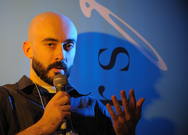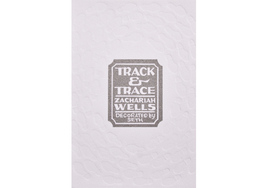 Zachariah Wells Photo by John W. MacDonald Zachariah Wells is the author of Unsettled (Insomniac Press 2004) and Track & Trace (Biblioasis 2009) and the co-author, with Rachel Lebowitz, of Anything But Hank! (Biblioasis 2008), a children's story illustrated by Eric Orchard. He is also the editor of Jailbreaks: 99 Canadian Sonnets (Biblioasis 2008) and The Essential Kenneth Leslie (Porcupine's Quill 2010). Originally from PEI, Wells lives in Halifax, where he works as a freelance writer and editor, and seasonally for Via Rail aboard the Ocean Ltd. Zachariah will be reading at the International Festival of Authors October 19-30, 2011. RUSTY TALK WITH ZACHARIAH WELLS Kathryn Mockler: How did you first come to writing poetry? Zachariah Wells: As with most things in my life, quite by accident. I always thought I'd be a writer, but had a vague notion that I'd write novels. I wasn't really into poetry. Then I wrote a couple of plays because I was in a theatre society. Then I took a couple of classes in university that introduced me to modern poets writing in an idiom I recognized and identified with, and I just started writing poems. KM: What keeps you going as a poet? Or why do you write? ZW: I try only to write when I really feel compelled to. As a consequence, I often go weeks between poems. So I don't really keep going. I just chug and sputter along. I keep at it because I have yet to grow bored of it. KM: What is the revision process like for you? ZW: Teachers tend to hate it when I answer this question, because the fact is that it is usually pretty light. I do a lot of my writing in my head, so by the time I start typing something out, it's already gone through several imaginary "drafts." Revision for me tends to be more a matter of figuring out which poems are worth keeping and which to ditch. That said, it took me many years of practice to get to this point. I used to spill out very rough drafts and then hack and chip away at them till they either fell apart or attained some kind of shape. It wasn't until I'd internalised revision as a process that I started writing the way I do now. KM: How would you describe the writer/editor relationship? ZW: Depends entirely on the editor. I've been on both sides of the table, so it's a dynamic I'm pretty comfortable with. An editor should make as strong a case for whatever changes s/he thinks necessary, but needs also to respect the writer's wishes. But the writer better be able to come up with a good reason for rejecting an editor's suggestion. Any writer who won't listen to a good editor's counsel is a fool. KM: What authors or books would you recommend to new poets? ZW: As many as possible. It's only by reading deeply and widely that you'll figure out who you are as a writer and what you might be capable of. KM: A piece of literary advice for new poets? ZW: How about a piece of extra-literary advice? Because life and work are not separate things: take chances in your life. Don't follow the path of least resistance. The more interesting things you do and the more weird things that happen to you, the more you'll have to write about and the more wisdom you'll bring to the task. KM: Do you have any advice to help new writers prepare to read their work to an audience? How do you prepare? ZW: Know it inside and out. Memorize it. Read it aloud to yourself, to your partner, to your pets. Record it and play it back. Respect your audience. They came to hear you, so make it as good as you can. If you're not comfortable with public speaking, get involved in amateur theatre, take voice lessons, etc. A reading should be something to enjoy, not tolerate. KM: Your funniest literary moment, if you have one. ZW: A well-known poet and philosopher once offered me condolences on the diminutive stature of my membrum virile. It's more funny because of who it was than what she said. KM: What you are working on now? ZW: This fall/winter, I'm collating and revising eight years' worth of literary criticism for book publication. I'm also editing a collection of poems by the excellent senior poet John Smith. And I'll probably write a few poems, but maybe not.  ZACHARIAH WELLS' MOST RECENT BOOK Track and Trace, Biblioasis, 2009 Description from Biblioasis: The poems in Zachariah Wells’s second collection range from childhood to dimly foreseen events in the future; they idle on all three of Canada’s coasts, travel the open road, take walks in the city and pause on the banks of country streams and ponds. Using an eclectic array of techniques and forms, from haiku to a crown of sonnets, in a voice that is personal but never private, Wells sketches a fragmentary biography of a life in progress, a study of post-industrial nomadic restlessness in a rootless age. Both elegiac and celebratory, Track & Trace considers how we live, how we shape our lives and how we are eroded and drifted by time and circumstance. |
Rusty Talk
Rusty Talk Editor: Archives
November 2017
Categories
All
|

 RSS Feed
RSS Feed
